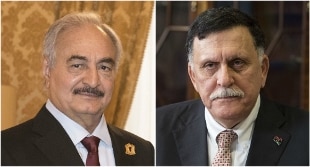Share
02 June 2020An official note explains that the National Reconciliation Government and the Libyan National Army have given the green light to reactivate talks on the ceasefire, disarmament and political and economic management of the country. The first step should concern the military aspects, entrusted to the commission made up of 5 officers per party, which met in Geneva, the last time, on 23 February last.It is probably an important turning point, even if there is still fighting on the ground, with Al Serraj's forces in difficulty again.
After managing to recover important positions, easing the siege of Haftar on the capital, the Gna army is now forced to fall back. The men of Cyrenaica have regained control of the city of Alasaba after a heavy aerial bombing. Tarhuna, a city southeast of the capital, also remains firmly in Haftar's hands. According to the LNA spokesman, Al Mismari, Tripoli's men are also withdrawing from Gharyan, after losing Asbi'ah.
Haftar's reaction is favored by the injection of means and resources of the last hours: a flock of 12 Russian Mig, armored, heavy artillery and troops. Targeted from the sky, Al Serraji's counter-offensive slows down and retreats, undermining the plan with which Tripoli hoped to quickly rebalance its presence on the territory, taking in particular control of the most important oil fields, still closed and in the hands of the tribes loyal to the Cyrenaica.
The possible turning point announced by the UN is evidently the result of the very strong diplomatic pressure of these days on the two contenders.
Prime Minister Conte, after hearing Al Serraj on Saturday, called Haftar yesterday to reiterate that there is no military solution. The only option is that of peace - this is the Italian position - under the guidance of the United Nations and in the path planned in January with the Berlin Conference.
Even the United States, Russia, France, Egypt, the United Arab Emirates, Tunisia, through a dense network of contacts move to defuse an increasingly threatening crisis for the balance of North Africa and the Eastern Mediterranean.
Turkey, the only foreign country officially deployed in the conflict with its army (alongside Tripoli), has obtained permission from the National Accord Government to start drilling for the search for hydrocarbons in a sea mirror that instead falls under Greek sovereignty -cipriota. This is due to an agreement with which, last autumn, Erdogan and Al Serraji arbitrarily redesigned the maritime borders of the area, assigning it to Libya.
The Turkish operation, which the European Union considers illegitimate, beyond the immediate damage to the companies authorized to explore the area, that is, Exxon Mobil, Eni and Total, represents a huge threat to the industrial plans of many other countries.
In a statement to five, a few days ago, Egypt, Greece, France, Cyprus and the United Arab Emirates called the Ankara initiative "illegal" and denounced the violation of airspace by Turkish fighters. It is a partnership against Erdogan's expansionism. Egyptian President Al Sisi, an ally of Haftar, accuses Turkey of having undertaken a nostalgic plan for a new Ottoman colonization of North Africa.
Cairo has long been working on a project that sees Egypt as a crossroads for gas supplies to Europe. Cyprus, with its huge underwater deposits, plays a key role in this plan. Egyptian interests coincide with those of Italy, France, Greece and Israel.
As if that weren't enough, in the disputed stretch of sea, the European naval units of the Irini mission have crossed since the beginning of May, with which Brussels intends to guarantee the embargo on weapons destined for the Libyan war.
The United States, which has long remained hidden, has in recent days taken a position of solidarity with Tripoli. From Washington the idea of relocating a brigade to a base to be built in Tunisia transpires. Hypothesis that triggered the reaction of the Tunisian Labor Union, the largest trade union organization in the country, which threatens to fight "by any means" any attempt to use Tunisia as a starting point for Turkish, American or other foreign interference in Libya.

